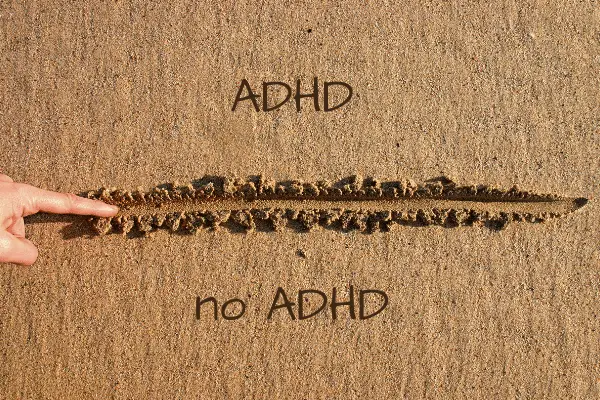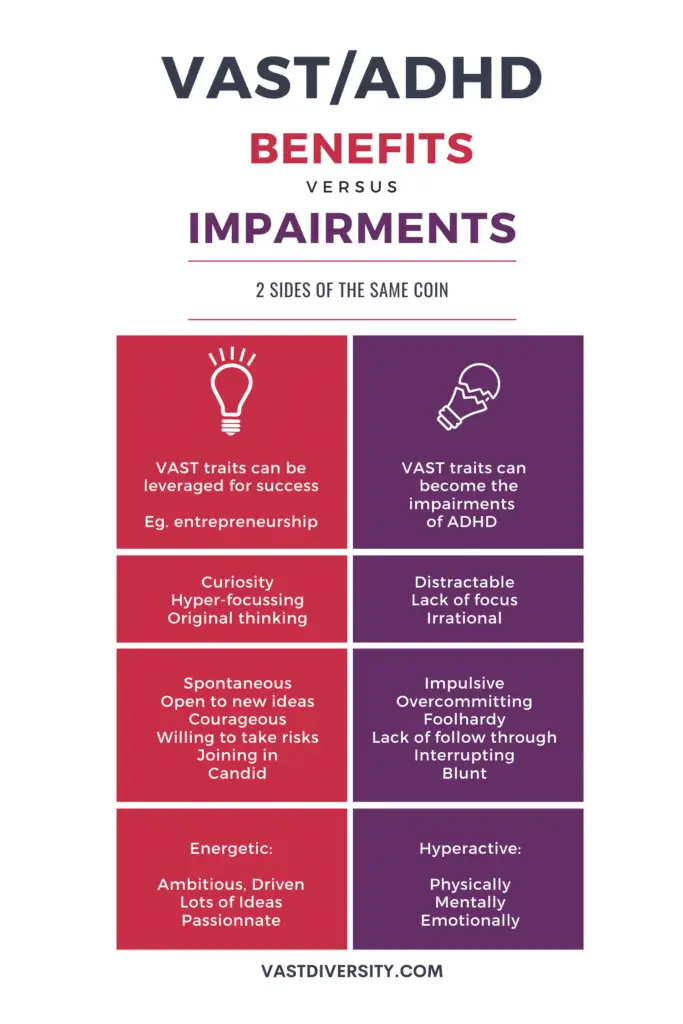Burnout Because of Adult ADHD?
In my mid forties, I developed ‘burnout’ from working a high stress job for many years. I’d been working too hard, and finally got totally overwhelmed.
(Note – Since writing this blog post it has become clear that ADHD is not the only reason for my burnout, but it definitely an important aspect.)
When I sought treatment, it was suggested that I might have ADHD (attention deficit hyperactivity disorder). At first this seemed ridiculous to me, because nothing I understood about ADHD would describe me. The term brings to mind a disruptive schoolboy who cannot pay attention in class.

Adult ADHD Traits?
ADHD symptoms are: Hyperactivity, Impulsivity and Inattention.
This didn’t describe me at all. I loved school and had succeeded academically. I was a very driven, independent, creative and passionate woman.
I didn’t have a ‘deficit’ of attention, if anything I got intensely focused on projects. I was successful, I didn’t have a ‘disorder’. Surely it was just stress, after all I had really overworked myself the last couple of years.

But as I read about ADHD, and used some adult ADHD assessment scales, I realized that my understanding of ADHD was totally wrong. Not only did I have ADHD but it had contributed to my burnout, and other challenges in my life.
But more interestingly, it had contributed to my successes as well. I learned that there were many other people like me, who had succeeded because of their ‘ADHD’ traits.
Adult ADHD: Driven, Independent and Passionate
The medical model of ADHD is defined by symptoms in 3 main categories: Hyperactivity, Impulsivity and Inattention.
Once I understood the positive aspects of these traits, I realized that I had already used them to describe myself : ‘a very driven, independent, creative and passionate woman’.

How can that be?
Well, it depends how you look at it….
Hyperactivity can manifest as being very ‘Driven‘.
Impulsivity (or a lack of patience) can lead to being ‘Independent‘ because you do not love having to explain your great ideas to others. And speaking of great ideas..
Inattention can also be seen as looking at something from various viewpoints. People with ADHD are often ‘out of the box thinkers’ who are very ‘Creative‘ at coming up with solutions.

And there is one more aspect of ADHD that is well known but has not been included in the diagnositic criteria – Strong Emotions – which can also be described as being ‘Passionate‘.
Success due to Adult ADHD traits
Many of my successes in life were due to these traits: I pushed myself on projects that interested me, saw opportunities others did not and took risks that paid off.

So how can this be, if I have a ‘disorder’? Well, it turns out that the ‘ADHD’ brain is an expression of a type of brain diversity. There is a paradigm shift happening in the way brain differences are viewed, thanks to the efforts of the autistic community.
There is the growing realization that there isn’t one ‘normal brain’ and that different brains aren’t ‘disordered’. There are natural differences amongst brains, and this is called neurodiversity.
Neurodiversity has always existed and is a normal part of the the human condition. That yes, there may be suffering as a result of neurodiversity, but that neurodiversity can also confer advantages to the individual and society.
ADHD or the New Term VAST
The term ADHD is completely inappropriate and confusing (it has nothing to do with a deficit of attention) and there is a push to change the name. This will likely never happen due to laws, regulations, entitlements and protections using the term ADHD.

The term VAST (Variable Attention Stimulus Trait) has been suggested to describe this
type of brain more generally. This allows us to acknowledge that VAST neurodiversity exists on a continuum. That the VAST mind confers positive traits as well as challenges, with ADHD as one extreme of the continuum.
So that covers the misleading name, and the lack of recognition of the positive attributes of the VAST mind.
ADHD or VAST in Women
It turns out there are a ton of other issues with our understanding and diagnosis of those that actually do meet the criteria for ADHD, particularly in women:
Emotions are a big part of the VAST/ADHD mind, always have been, and many adults with
ADHD find this the most debilitating symptom. But emotions were excluded from the core DSM
criteria, and many providers have no idea that ADHD includes emotional dysregulation, likely leading to many a misdiagnosis.

Women and girls present the symptoms of ADHD differently, so they are often underdiagnosed.
Some medications affect the VAST mind differently, due to differences in our brain’s neurotransmitters.
A VAST mind can shift into ADHD with stress. For women, the same can happen with hormones at certain times of the menstrual cycle, after childbirth, in perimenopause and menopause. Some women actually get such bad attention issues at menopause they worry about early Alzheimers. And there is barely any research on any of this.
So, while I was shocked to be diagnosed with ADHD as a woman in my forties, I realize I was extremely fortunate. Many women are treated for anxiety or depression for many years before realizing they have ADHD.
ADHD or VAST and Burnout
And this is a problem because having ADHD can actually put you at risk of burnout. ADHD is really about dysregulation and people with ADHD may not be as in tune with the effects of stress as someone else.

They can push themselves harder, and while that may have worked when they were younger, it can cause a complete collapse with an older, less resilient body.
Figuring out how your brain works, and how to optimise your brain and body care for your unique situation can be the first step to recovering from burnout.
There are lots of options including understanding ADHD symptoms like hyperfixation, body repetitive behaviors like scalp picking, ADHD ‘object permanence’ and the way ADHD can cause insomnia. How you can using NSDR protocols for brain rest and various supplements like Omega-3, or the Huberman Lab Sleep Cocktail may help optimize your functioning.
And then you can leverage your VAST/ADHD traits to work for you, not against you.

